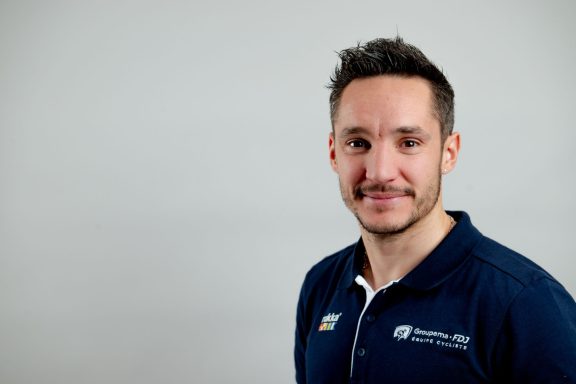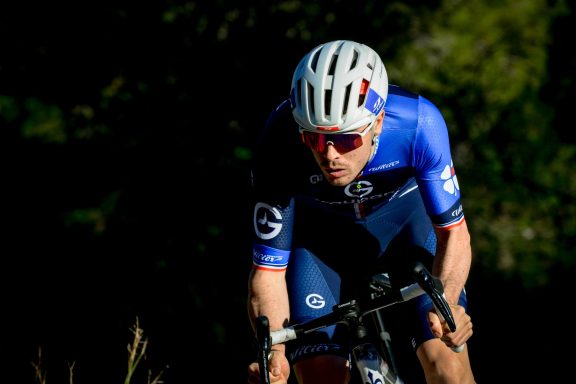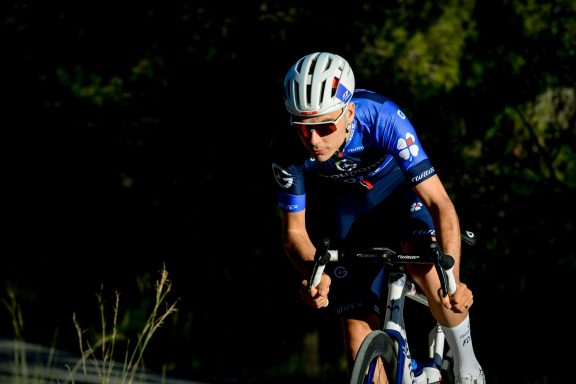The crashes, the failures, the doubts, the hopes, then the rebirth. Over the 2024 season, David Gaudu experienced it all. After an eventful first part of the season, including a difficult Tour de France, the Breton climber gradually made his return to the highest level in the late part of the year. He sat down to talk about it in detail, and in all honesty.
David, let’s go back to the day after the Tour de France’s finish. How did you feel at that moment?
I woke up in the morning without feeling like I’ve just done the Tour, actually. Of course I was there, but it was very special this time. It might be the only year where I wasn’t there for the general classification or to help someone who was fighting for it. I was obviously tired physically, but absolutely not mentally. The day after the Tour, I was very much aware that only the Vuelta could still save my season. Nobody wants to have a blank season, and I really didn’t want to have one – even if I won the Tour du Jura before -. When I woke up, I was already in Vuelta mode. It’s funny, I’ll always remember that in the Couillole stage, where I was really struggling, guys like Valentin or Romain, when they saw me fighting through, told me: “Come on man, good job, you’re working for the Vuelta”.
“I had nothing left to lose”
Why did you think racing the Vuelta was a good idea?
First of all, we had already planned to ride two Grand Tours last winter. I wanted to have a full season in terms of racing days after two seasons with less than sixty. That’s all I could think about: to get more and more racing days. I had to do a complete last part of the season, and I had almost never done two Grand Tours in a year. When I did it in 2020, the Vuelta had been shortened by 2-3 days, and I had also left the Tour a little before the end. It was also a way to have a big goal after the Tour, and the Vuelta was perfectly placed in the calendar. Nervously and mentally, it was also ideal because there were not too many sprints, and because the stages are usually less stressful than on the Tour. When I felt that I no longer had the required level at the end of the Tour, I knew that I was just working for the Vuelta. That being said, I had to race the Tour. If I had gone to the Vuelta without doing the Tour, my Vuelta would not have been the same, I’m sure of it. I obviously started the Tour being 100% focused on the Tour, but when I was struggling during the last days, it was clear that I was already thinking about the Vuelta.
You said that you were “living for the Vuelta” between the two Grand Tours. Didn’t you have too high expectations, with the risk of coming down to earth with a bang?
I’m the type of person who always moves forward. If I had failed at the Vuelta, it wouldn’t have changed much to the situation. I was already struggling for 6-7 months, so it would have been like the rest of the season. It was already bad up until then, it would have just continued to be bad… I would have kept the same state of mind, which is telling myself that the next attempt could be the right one. It was my last chance to avoid a blank season, and it did avoid it. At that stage, I had nothing left to lose, but everything to gain by preparing for this goal.
Did fighting for the overall seem fundamental to you?
Initially, it wasn’t really the plan, but when I saw that my form was gradually improving in August, that I felt good, I wanted to race freely. As I didn’t fight for the GC at all on the Tour, I also didn’t feel mentally tired. On top of that, I was supposed to support Lenny if he had been there, to race more with a free spirit, and to take over only if he had cracked. Finally, going to the Vuelta to fight for a stage win isn’t something I was interested in. That’s what I tried to do on the Tour this year, and I didn’t like it. Obviously because I didn’t have any results, and it might be strange to hear, but it’s almost easier for me to enter the overall top-10 on the Tour than to go and win a stage. What I experienced on the Tour was hard to swallow, not only because I wasn’t in top form, but also because the Tour was extremely blocked. Only one breakaway was successful on the hilly profiles. For a climber who goes for these stages, it’s extremely frustrating, especially when you know how hard it is to enter a breakaway on the flat in the Tour. The Vuelta might have been more open, but I didn’t want to live that kind of Grand Tour again; to find myself in the gruppetto in order to attack the next day, without being sure that it would pay off.
“I was ‘in the zone’ in the last week”
Has the 2024 Tour definitely buried the “breakaway climber” approach?
Not necessarily. I think I could have this philosophy in the future, because I will perhaps do two Grand Tours in a year again, and I won’t fight for the general classification on the Tour for another ten years. It can be an idea, but it will depend a lot on the circumstances, the route, the profiles, the starts, and finishes. Also, I do not forget that the polka dot jersey was my dream growing up. Yet, it is complicated to win it when you fight for the general classification, unless your name is Pogacar or Vingegaard…
About the Vuelta, do you remember clearly when you started to feel like you were back?
The starting point for everything, and what unlocked it all, was the Granada stage, where I was in the break. In the morning, I told the guys that my only chance of finishing with the group of favorites was to have an early lead, and everything went well. But above all, the day after the rest day, I still felt super good and super fresh. I felt that something clicked, that my legs weren’t exactly like the week before. The following day, we dropped O’Connor on a small hill with 3-4 other riders. There, I thought it was crazy. From that moment on, it got better and better every day. I struggled a little bit on the Cuitu Negru, probably because I didn’t have the right strategy, but I was ‘in the zone’ in the last week. I felt easy in Carapaz’s wheel when he attacked, I finished second at Moncalvillo behind Roglic, and I also went all-in on the last day. It all started at the beginning of the second week.
What did you feel when you finally found yourself along with the big guns?
At that point, I still took a step back. I thought that I had recovered well but that I had to avoid any backlash. You never know… I felt that I was on the right track, that it was promising, but you always have to be careful. That said, from the start of the stage, the next day, I noticed that my legs were going really well, and I knew that it was on. I didn’t know how long I would be able to keep up this form, but in the end, it lasted quite some time (smiles).
“I needed this challenge and to get back to the top”
Was taking your own pace up the climbs also a way to take some confidence back?
Maybe a little, but I think that I followed the attacks much more on this Vuelta than on the 2022 Tour de France, for example. Skjelmose used the “steady effort” much more than I did, and I rarely stayed with him actually. I preferred to follow the attacks. The steady effort left its mark on the stage that Michael Woods won because I was dropped very early. They sprinted from the bottom all the way to the top, it was crazy! As for me, I really managed my climb perfectly. I caught about fifteen competitors along the way and finished sixth among the favorites, so people remembered it. Yet, apart from that, I didn’t take my own pace very often. Even if the raw performance was good that day, that’s not what I remember personally. I rather remember to have been able to follow Carapaz when he attacked, to have been aggressive before the favorites on certain stages, and to have tried everything at Picon Blanco. These are the images that I remember from the Vuelta. It’s also the part that I want to show of myself. When I feel good, when I’m confident, I’m not afraid to dare and try.
Do you feel like you’ve completed a proper challenge on this Vuelta?
For sure when I showed up in Lisbon, there was maybe 20%-30% that I would succeed, but the start to everything is believing, and I believed in it. I think that from the moment you believe in something, you have to go for it. If it doesn’t work, it doesn’t work, but it might work next time. If you go without believing, you can be sure that it won’t work. I needed this challenge, to get back to this path and to the top. The team knew it, my teammates knew it. During the second week, when I had super legs, I felt that many of the guys preferred to stay with me, support me as much as possible and give everything they had rather than go in breakaways. It was heart-warming.
“You have to be irreproachable”
How do you make sure that your teammates regain confidence?
You necessarily have to bring performance, but also be able to cope with the difficult moments, and particularly handle poor performances with the right attitude. That’s probably the hardest part. Poor performances happen, but you always need to pick yourself up. That’s what I tried to do this year. After my crashes in Paris-Nice and the Tour of the Basque Country, I managed to win. The Ardennes Classics didn’t go well, but I managed to get back on track in the Tour de Romandie. I always tried to get going again right away, in races as well as in training camps. Behaviour on and off the bike is extremely important. When you’re with your teammates, you have to be irreproachable. You can’t just sulk. It might sometimes have played against me, and I wasn’t mature enough to understand it.
Where do your Vuelta’s data fit in your performance history?
In the high range, even very high range for some data.
Some fans made a connection between your return to the highest level and your change of style…
It’s quite funny, but the long hair project started in the beginning of May. It just took a while for it to grow. In the end, it was almost too long compared to what I had imagined, but from the moment I managed to tie it back properly, I left it this way. I’m not saying I believed in the causal link, but I just felt good. You could almost say a new look for a new career (smiles).
“The most important season? I’ll tell you that next year”
What state of mind did you go on holidays with?
With a very, very good state of mind. I felt free, relaxed, and I didn’t think about cycling anymore. When I go on vacation, I really go on vacation. I leave cycling aside 2000%. For example, I was in Corsica when the Tour de France’s route was released, and I only quickly read about it the next day. I just saw that Mûr-de-Bretagne was on the menu (smiles). I went fishing, I did a few hikes. I just took advantage of the vacation to rest and do everything I can’t do the rest of the year. I was really looking forward to racing at the end of the season, but I was also really looking forward to it being over because after almost 90 days of racing, I felt like I was starting to get tired in Lombardia.
Do you consider that a new chapter in your career has started?
I would say that I’m back on the path I had set for myself. As I tell everyone, what drives me is being a general classification rider. That’s what I’ve always done, and that’s almost all I can do. It’s a bit of a return to the basics, hopefully in a stronger version. I wouldn’t say that there’s been a proper break in my career. I was ninth in the Tour a year and a half ago, which isn’t a bad performance, and I was second in Paris-Nice and fourth in the Tour of the Basque Country less than two years ago. I want to get back to this path. I’ve been able to produce these performances in the past because I believed I could do it, so I have to keep believing. I’d like to be more aggressive, of course, but you have to be really strong to attack nowadays. I want to have fun, but I don’t necessarily want to change things, because I finished fourth in the Tour in my own way, and it was still a pretty amazing moment. I just want to relive these moments.
What are your dreams now?
Above all, I’m chasing results. I want to be as high as possible in the GCs when the big names are there, and to win races. When I won the Tour du Jura or on the Tour de Luxembourg this year, it was so great, honestly. Raising your arms is still the best thing that can happen to a cyclist. That’s also why we ride our bike. I would like to go to the Giro, I would like to win a stage on the Tour. My ultimate dream is to win it or get on the podium. I know it will be extremely difficult, that there is very little chance that I will succeed, but if you don’t believe in it, you might as well not go.
Would you say that the 2024 season, if it is not your best season, is perhaps the most important one?
I will tell you that next year (smiles). For sure, this is an important step in my career. You inevitably grow up from all the difficult experiences you go through. All riders, whoever they are, have to face challenges during their career. The most important thing is to be able to bounce back. I managed to do that, but now it has to continue. And then, it’s not my best season, but it’s not the worst either with two victories and sixth on the Vuelta (smiles). Is it the most important one? I had important stages in my career between 2018 and 2021, pivotal seasons where a lot happened. Everything will depend on what happens next. So we’ll see next year when we wipe the slate clean.



No comment